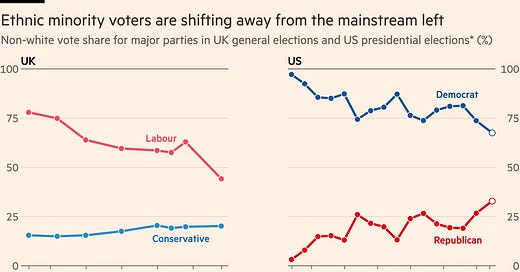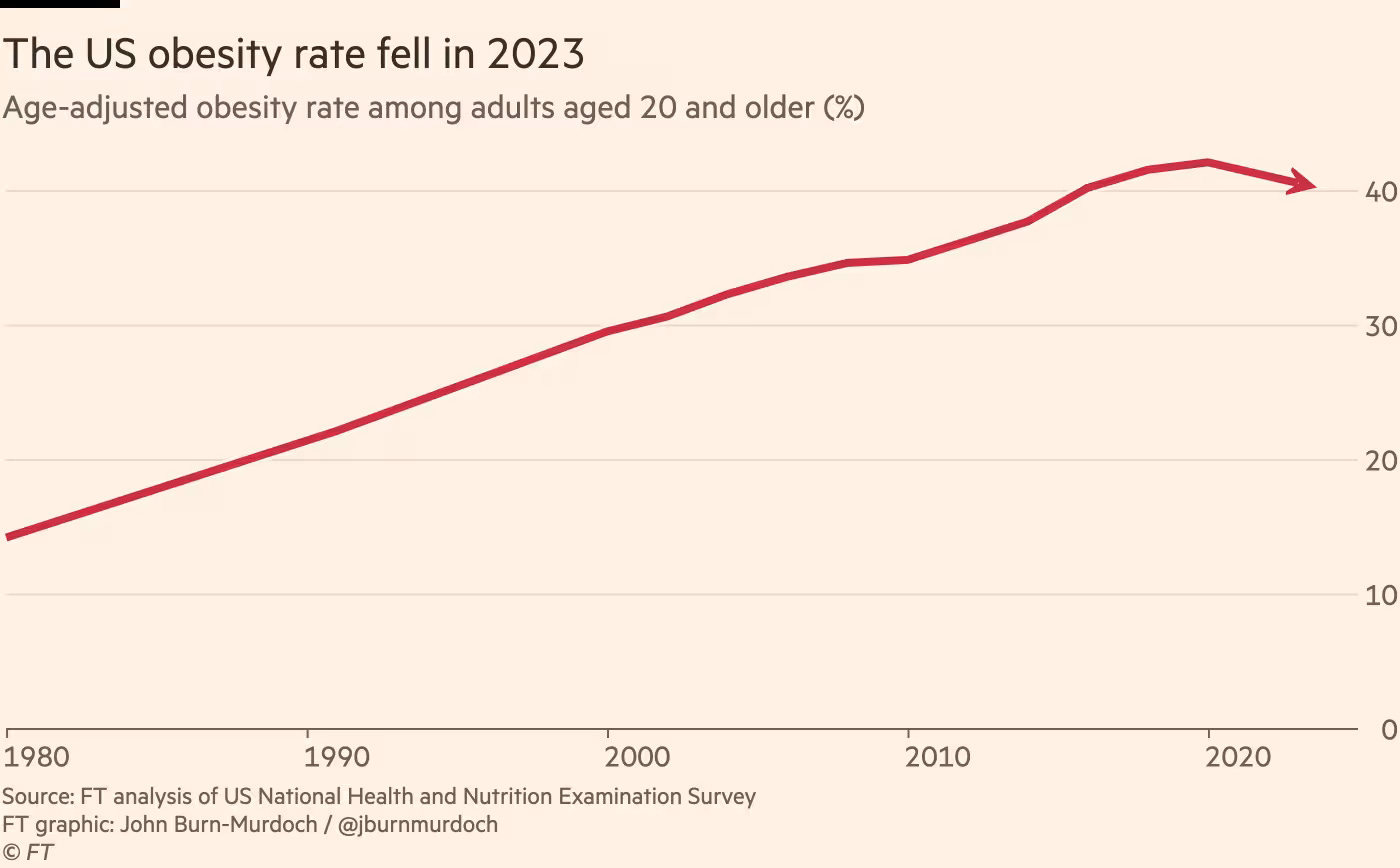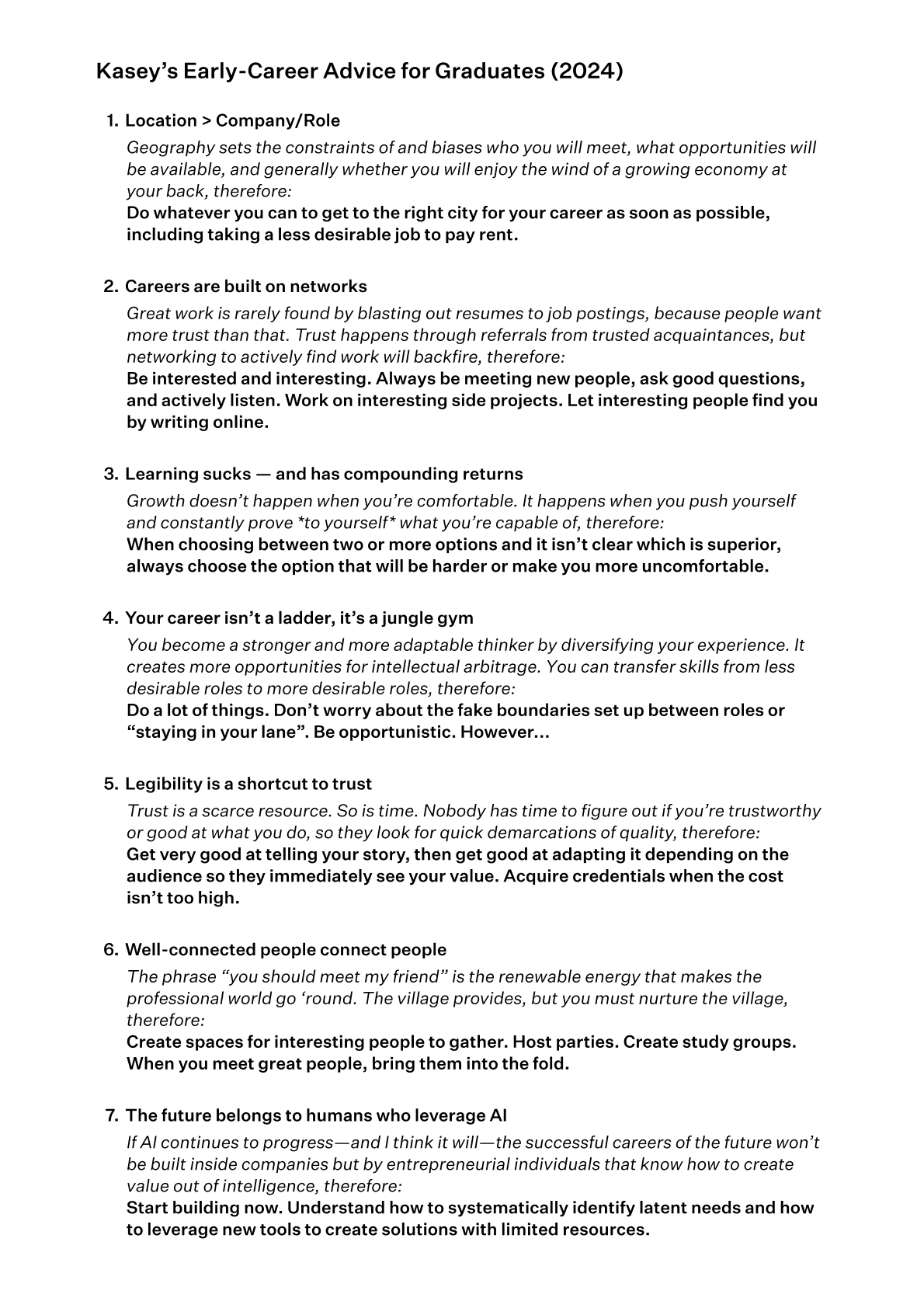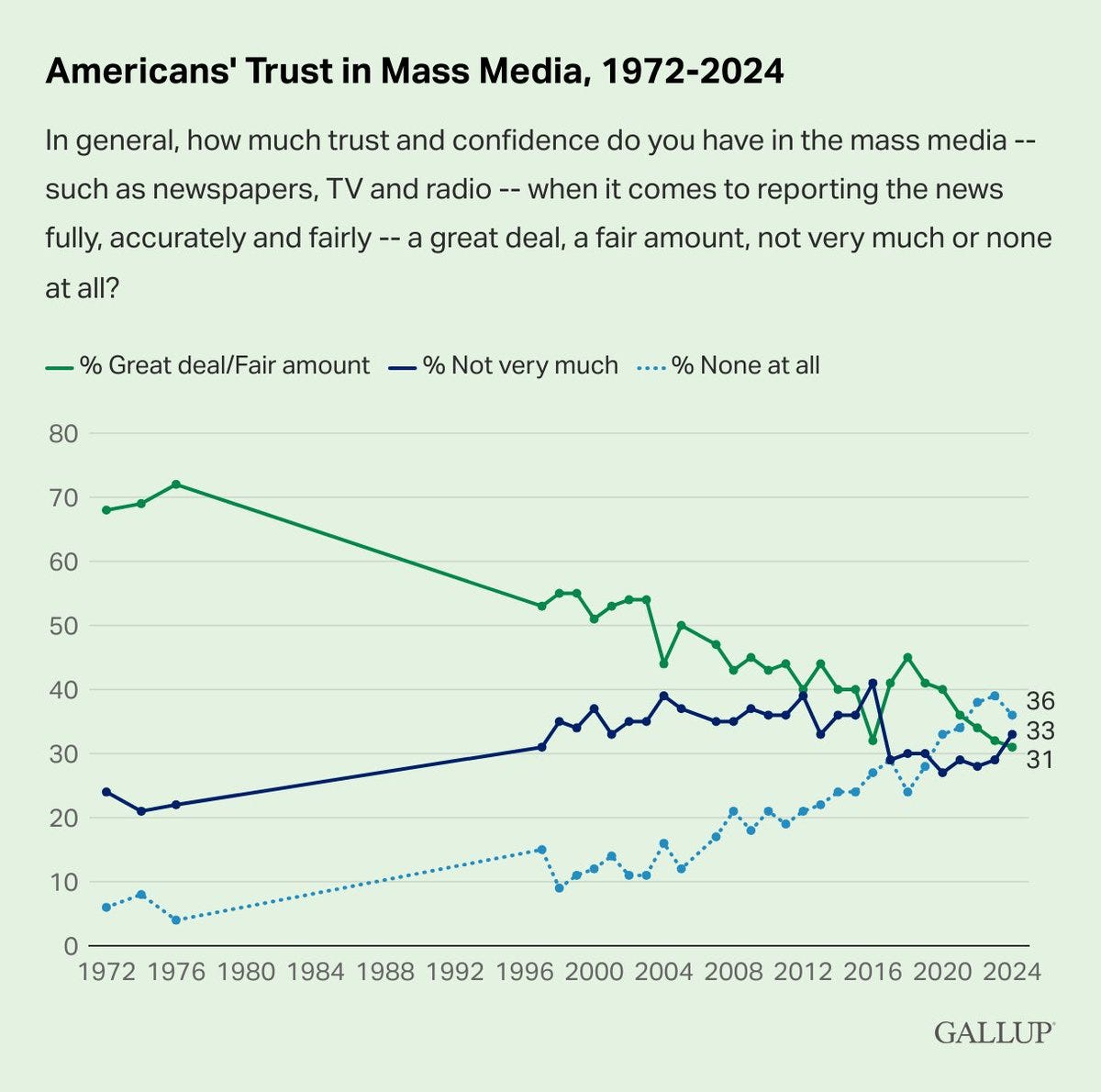Peak Obesity
Falling obesity rates, minority voters shifting right, South Korea going to the dogs, and more in this week's digest.
What I’m reading: If Only by Vigdis Hjorth.
Here’s some good news. The great John Burn-Murdoch at the Financial Times reports that we may have passed “peak obesity.” As you can see, after many years of rising obesity, the obesity rate actually fell last year.
He attributes it to widespread adoption of weight loss drugs like mounjaro and ozempic. These drugs not only work, but they seem to have a pervasive positive impact on a large number of health conditions. This could be huge:
In America and beyond, the dividends will be enormous. After smoking rates began falling, rates of lung cancer promptly peaked and then dropped precipitously, saving millions of lives. If obesity curves do now descend, rates of cardiometabolic disease and death should follow. More promising still, a growing number of trials find the addiction-suppressing mechanism of the same drugs can also reduce rates of alcohol misuse and even avert opioid overdoses.
JBM notes that the healthcare system in the US is superb at convincing people to take expensive drugs. Combined with the fact that we have higher obesity rates, that means the US might see outsized gains.
The US leading the descent is a beautiful twist. Its unparalleled consumer culture sent its obesity rate rising faster and further than almost anywhere else. When the solution was regulation or moderation, America was at a disadvantage. But when procuring and distributing large quantities of pharmaceuticals is the name of the game, the US is unrivalled. These drugs are more widely available there than anywhere else. [emphasis added]
I wouldn’t be surprised if there’s more going on here than drugs, however. A curious number of social pathologies flatlined at around 40%. The divorce rate reached 50% before falling back to 40%. The out of wedlock birth rate flatlined at around 40%. I’m not certain this means anything, but it’s something worth exploring.
Ethnic Minorities Are No Longer Monolithically Left
Many people have noticed the surprisingly high support for Donald Trump by ethnic minorities. Hispanic voters in the US seem to be shifting right.
In another great FT piece, John Burn-Murdoch shows how this is not just a US phenomenon, but is also happening in the UK. Here’s one of his charts:
He writes:
In the US, the majority-Hispanic Rio Grande valley swung sharply towards Donald Trump in 2020, Vietnamese Americans in California deserted the Democrats, and majority-Black neighbourhoods in Philadelphia became decidedly less blue. Republicans performed better with non-white voters four years ago than at any time since 1960.
One of the reasons for this shift in the UK is that the actual policy preferences of minority voters are often conservative. The left wing parties, dominated by highly educated whites that are unrepresentative of their countries as a whole, have views that are very out of step with minorities.
Measuring public opinion among small and hard-to-reach groups is challenging. But this week a groundbreaking new study by the think-tank UK in a Changing Europe and polling company Focaldata did just that, shedding light on the wide range of attitudes and priorities among different minority groups in Britain. It found that they were often closer to the conservative than progressive end of the spectrum. [emphasis added]
This piece shows why it’s important to have a source of global, not just American news. It’s very easy to look at trends in the US such as the rise of populism, declining fertility, or the rightward shift in minority voters and attribute it purely to domestic factors. But if we apply the global lens and see that these trends are happening in other places at the same time, we can see that bigger forces are at work.
The Financial Times is an excellent source of global news, but is very expensive. The Economist has good global coverage as well. France’s monthly Le Monde Diplomatique has an English edition that gives both great global coverage and a non-Anglosphere perspective. The separate French daily Le Monde also has an English language edition today, although I don’t read it.
South Korea’s Gone to the Dogs
South Korea has some of the most advanced development of some global socially dysfunctional trends like falling marriage rates, a very low birth rate, hostility between men and women, and political polarization by gender.
The NYT just had a piece on how people in Korea are turning to dogs for companionship.
The deceased lay wrapped in a cotton blanket, surrounded by white roses and hydrangea, angelic figurines and lit candles and incense. A wall-mounted screen displayed photographs of him. His 71-year-old companion, Kim Seon-ae, convulsed with tears as she bid farewell, caressing his head and face. Next door, young uniformed morticians prepared for his cremation.
The elaborate and emotional ritual was for a white poodle named Dalkong, who was nestled in a willow basket with his eyes still open. “He was like a virus that infected me with happiness,” said Ms. Kim, who had lived with Dalkong for 13 years until he succumbed to heart disease. “We were family.”
…
The boom in pet services has changed the country’s urban landscape. Hospitals and shops catering to pets have become ubiquitous, while childbirth clinics have all but disappeared, as South Korea’s birthrate has become the lowest in the world. In parks and neighborhoods, strollers are more often than not carrying dogs. Online shopping malls say they sell more baby carriages for dogs than for babies.
…
Now, dogs are family members that get splurged on. Sim Na-jeong says she wears an old, $38 padded jacket but has bought $150 jackets for Liam, a jindo she adopted from a shelter four years ago. “Liam is like a child to me,” said Ms. Sim, 34, who does not plan to get married or have children. “I love him the way my mom loved me. I eat old food in the refrigerator, saving the freshest chicken breast for Liam.” Her mother, Park Young-seon, 66, said she felt sad that many young women had chosen not to have babies. But she said she had come to accept Liam as “my grandson.”
…
“People used to treat pet dogs as something they owned and showed off, something they could also discard if they behaved badly,” Ms. Ko said. “Now they treat them like family members. If they turn aggressive, they don’t think of replacing them but think of what the problem is and what they can do to fix it.” [emphasis added]
Click over to read the whole thing.
The article also notes that dogs used to be eaten in South Korea, but now that’s been banned. As with pet names like “Liam,” we can see the Western cultural impact here.
I think it’s great to get a dog if you don’t have kids. What’s new and strange here is the way these animals are being anthropomorphized. I started noticing this in NYC before we moved. People wore their dogs in what were essentially baby carriers or ferried them around in a dog stroller that looked very similar to a baby stroller.
This is an example of how the maternal instinct cannot be suppressed. People can talk a good game of not wanting kids, but when we see them getting dogs and treating them like children, we can see that this isn’t entirely true.
I wrote more about South Korea’s dysfunction last year.
Status Hierarchies Follow-Up
My tweet about status hierarchies struck a nerve, drawing over a million impressions so far and still going. It actually provoked a lot of great interaction and personal reflections that are worth reading, though there was so much I couldn’t keep up with it all.
I do want to share a couple of them. The first is from techie and urbanist Kasey Klimes, who related it to his own pieces of career advice for graduates. I thought these were good so am reposting his list.
I think you can see the overlap here.
And the Lutheran theologian Jordan Cooper posted a short video with some reflections on this topic. This one is interesting because it shows his Lutheran inflected view of vocation (I’m Reformed), and also his cultural background as a New Englander (I’m Midwestern).
Best of the Web
NYT/The Athletic: ‘I literally can’t stop.’ The descent of a modern sports fan into sports gambling addiction.
Speaking of sports betting, the dissident right writer Scott Greer wrote a piece about what he called “FanDuel Americans.” Many traditional conservatives seem to have this conceit that at some point America will “come to its senses,” or that if the country stays on its current path, somehow reality itself will impose discipline, which will lead to a crash, which will cause people to repent.
Few of them consider the possibility that the left and its cultural influences could win and the country still go on basically fine. This is basically the scenario Greer paints, and it’s far from unlikely.
They are FanDuel Americans—and they’ve got a lot to look forward to in the new America. The term “Barstool Conservative” has often been applied to this group, but it’s not the best way to see them. That label was coined by writer Matthew Walther to bemoan the American Right’s increasing lack of interest in traditional social conservatism. It’s an explicitly political orientation. FanDuel Americanism is much broader. It’s a social and cultural mood that can impact politics, but its disposition is about deprioritizing politics. It’s about distracting yourself from the problems of the world in a non-woke, bro-y way.
…
FanDuel Americans/ism is the best way to describe this phenomenon. America now offers plenty of ways to distract yourself free of politics. Individual choice has never been stronger and more sacrosanct. A person is allowed in America to legally buy weed, place a bet, get a abortion (in most states), change their gender, marry whoever they want, watch whatever they want, and do whatever they want to their body. There’s an endless array of options of what to do with your time. You can play video games or watch porn all day and there’s no one to stop you. Dating apps offer the appearance of unlimited choice of who you want to court and/or sleep with. Individual choice reigns supreme in modern America….To many right-wingers, this future looks like a nightmare. [emphasis added]
Gallup: Americans' Trust in Media Remains at Trend Low - A brutal decline
Jake Meador: The Evangelistic Flip - Free to read but registration required
Yet if you look around today, something has shifted: To my eyes there is very little evangelistic openness in the center-left world. There are still plenty of Christians to be found, but virtually all of them that come to mind for me are not adult converts and came from Christian backgrounds.
But if you look at the right or the reactionary ends of the political horseshoe where right and left begin to converge, the picture is quite different: Jordan Peterson's wife is now Catholic. Ayaan Hirsi Ali, a one-time new atheist who did events with Christopher Hitchens and Richard Dawkins, is a Christian. So is Paul Kingsnorth and Martin Shaw.
Ryan Burge: What Religious Groups are The Most Politically Active? - The liberals, of course.
New Content and Media Mentions
R. R. Reno wrote an extensive engagement with my question about Richard John Neuhaus in his First Things column this month. The whole issue is great, and an example of why you should subscribe to First Things.
New this week:
What Ladders Are You Climbing? - Picking the right ladders to climb is one of the most important things we do in life - An expanded version of my viral tweet on status hierarchies.
Don't Be Fooled, Pot is Dangerous (paid only) - Even the New York Times is deeply troubled by the problems with our Wild West approach to legalizing pot
My podcast this week was with Utah State professor Austin Knuppe on the fate of of Middle Eastern Christians.
Subscribe to my podcast on Apple Podcasts, Youtube, or Spotify.










I went over to First Things to read Reno's response to you, Aaron. He's obviously a smart guy, and he writes very well (although perhaps not quite with Neuhaus's snap), but I think he's missing the point on Dewey, especially.
Reno argues, essentially, that nobody reads -- or cites -- Dewey that much anymore, so his influence has waned. But I work in the education field, and I see the influence of Dewey and his contemporaneous progressives *everywhere*. Dewey's pragmatic, progressive vision of education is the very air that's breathed amongst professional 'educators'. No one argues for or cites that which is ubiquitous.
Thanx for the video of Lutheran theologian Jordan Cooper , it makes me feel better about my career and life(retired now). I very much look forward to his book on Luther, and Luthers’ view of the stations in life and their duties.
His book on Liturgical Worship has been very helpful as I was raised Catholic, was evangelical for four decades (Assembly of God and Cavalry chapel), became LCMS as result of looking for a church choir to sing in 5 years ago.
I had no idea 🤔you could celebrate a liturgy and still be a faithful son of the reformation‼️